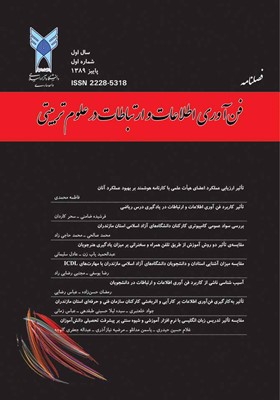تأثیر ارزیابی عملکرد اعضای هیأت علمی با کارنامه هوشمند بر بهبود عملکرد آنان
محورهای موضوعی : فن‎آوری اطلاعات
1 - دانشگاه اراک
کلید واژه: ارزیابی عملکرد, عملکرد آموزشی, عملکرد پژوهشی, عملکرد اجرایی, کارنامه هوشمند,
چکیده مقاله :
این پژوهش جهت استفاده از پتانسیلهای علم کامپیوتر در مدیریت آموزشی شکل گرفت و هدف آن بررسی تأثیر آگاهی از نتایج ارزیابی عملکرد اعضای هیأت علمی به وسیله کارنامه هوشمند بر ارتقای کیفیت فعالیتهای آموزشی، پژوهشی و اجرایی آنان بود. جامعهی مورد مطالعه شامل اعضای هیأت علمی واحدهای دانشگاه آزاد اسلامی و نمونهی مورد مطالعه شامل 482 نفر از جامعهی مذکور بود که به دو گروه آزمایشی و کنترل بر مبنای گروههای همتا تقسیم شد. ابزار مورد استفاده در این پژوهش، کارنامه هوشمند ارزیابی عملکرد اعضای هیأت علمی بود که پیش از این مدل سازی و طراحی گردیده بود. پس از دریافت اطلاعات مورد نیاز از گروه آزمایش و کنترل با استفاده از کارنامه هوشمند ارزیابی عملکرد اعضای هیأت علمی، کارنامه عملکرد آموزشی، پژوهشی و اجرایی برای استادان دو گروه آزمایش و کنترل صادر گردید. کارنامههای گروه آزمایش برای آنان ارسال و کارنامههای گروه کنترل ارسال نگردید. پس از سپری شدن یک ترم دوباره برای دو گروه کارنامه نیمسال دوم نیز صادر گردید و تفاوت عملکرد دو گروه در قبل و بعد از دریافت کارنامه با استفاده از آزمون t مورد مقایسه قرار گرفت. نتایج نشان داد که متغیر مستقل (کارنامه هوشمند) بر بهبود عملکرد آموزشی و پژوهشی اعضای هیأت علمی مؤثر بوده، اما بر عملکرد اجرایی تأثیر معناداری نداشته است.
This research was performed to use the potentials of computer science in educational management. Its aim was to study the effect of understanding the results of faculty members performance by Intelligent Informational System and its effect on promoting the quality of their instructional, researching and implementing activities. The statistical population of the research included the faculty members of Islamic Azad University branches, and the statistical sample consisted of 482 of the population which were divided into two experimental and control groups based on peer groups. The Intelligent System which had been designed before was applied as a tool for evaluating the performance of the faculty members. The results of instructional, researching and implementing performance were produced for two experimental and control groups of faculty members after receiving the required information from both groups by using the Intelligent Informational System for evaluating the performance of the faculty members. The results were sent only for the experimental group, but not for the control group. The results were produced for two groups again after passing one term. The difference of performance between two groups was compared by using t test after and before receiving the result. The findings showed that the independent variable (result or system output) had an effect on improving the teaching and researching performance but had no significant effect on implementing performance of the faculty members.


